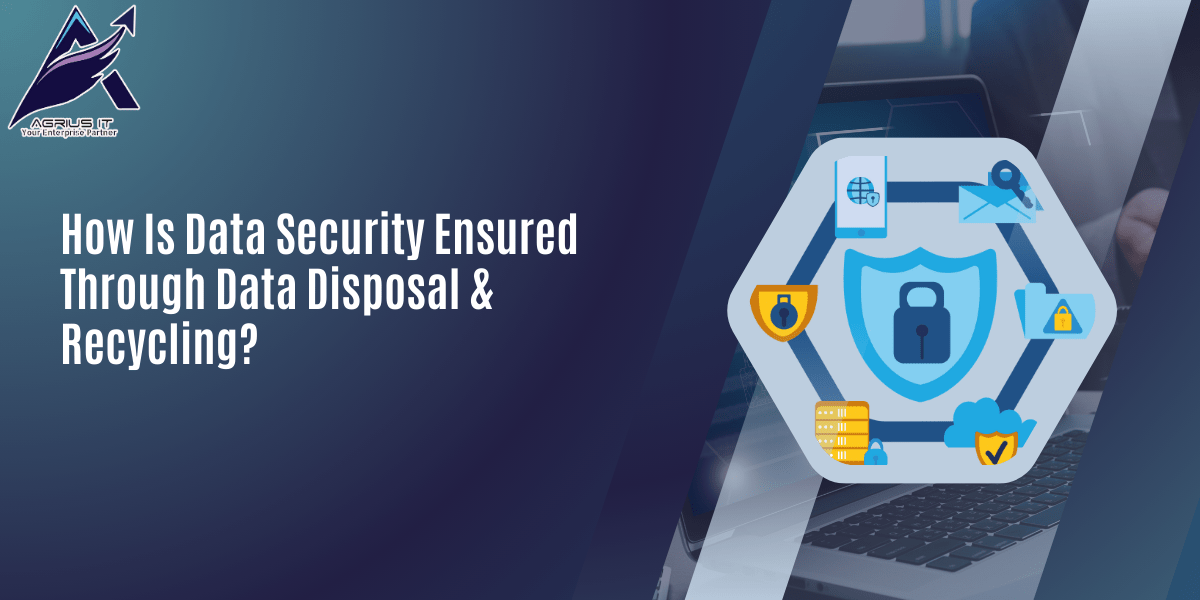How Is Data Security Ensured Through Data Disposal & Recycling?
Businesses in every industry are handling more data than ever to meet customer needs and improve their operations. While this helps in many ways, it also brings challenges, especially when it comes to disposing of old or unused data safely. If not handled properly, sensitive information can be accessed by unauthorized parties, leading to security risks. Proper data security, including secure disposal methods, ensures that information is either permanently erased or securely repurposed, preventing misuse. Third-party maintenance services play a key role in helping businesses manage this process efficiently, keeping their data security intact while reducing waste.
Understanding Data Disposal and Recycling
Data disposal is the process of permanently removing data from storage devices like hard drives and servers. This ensures the information cannot be recovered or misused. Simply deleting files is not enough, as deleted data can often be retrieved. Secure data security measures ensure that old information is completely erased and cannot be accessed again.
Data recycling involves reusing storage devices while ensuring no sensitive information remains on them. Businesses often recycle their IT equipment by selling, donating, or repurposing old devices. However, before these devices are reused, they must go through a secure data wiping process to ensure all previous data is erased, maintaining data security.
Secure Methods for Data Disposal and Recycling
Proper data disposal and recycling involve different techniques to ensure security. Some effective methods include:
- Data Wiping: This is where specialized software overwrites existing data multiple times to make sure it cannot be recovered, ensuring data security.
- Physical Destruction: For storage devices that are no longer needed, physical destruction like shredding hard drives ensures data cannot be accessed.
- Degaussing: A powerful magnet is used to erase data from magnetic storage devices. This permanently removes data but makes the device unusable.
- Encryption Before Disposal: Encrypting data before disposal adds an extra layer of security. Even if the storage device is compromised, encrypted data remains unreadable, further protecting data security.
Best Practices for Secure Data Disposal
Organizations should follow these best practices:
Create a Data Disposal Policy:
A data disposal policy should outline the process for securely erasing data and disposing of devices. It should specify the responsible parties, methods used, and timing. This ensures secure handling and prevents any accidental data leakage.
Use Certified Data Disposal Services:
Certified data disposal services specialize in securely destroying data and recycling old devices using industry-approved methods. They ensure that all sensitive data is irretrievably erased or physically destroyed. Partnering with these experts minimizes risks and ensures compliance.
Keep Records of Disposed Data:
Maintain clear documentation of each data disposal instance, including the date, method, and person responsible. This provides accountability and helps prove compliance with regulations. It also ensures no data is inadvertently mishandled or left behind.
Train Employees on Data Security:
Employees should be trained on the proper procedures for disposing of data and devices securely. This includes understanding the risks of improper disposal and the methods used. Proper training helps prevent accidental breaches and ensures consistent practices across the organization.
Verify Disposal Methods
Before disposing of devices, verify that all data has been completely erased using secure methods. If physical destruction is used, ensure the devices are fully destroyed. This extra step provides assurance that no sensitive data remains accessible.
Why Proper Data Disposal Matters
Failing to dispose of data properly can have serious consequences. Here’s why businesses should prioritize secure data security disposal:
- Compliance with Regulations: Many industries have strict laws on data protection. Failing to comply can result in heavy fines.
- Protecting Customer Information: Disposing of customer data securely helps maintain trust and prevent identity theft.
- Reducing Environmental Impact: Proper recycling reduces electronic waste and promotes responsible disposal.
Conclusion
Proper data disposal and recycling are vital for protecting sensitive information and reducing risks. Businesses must ensure old data is either completely erased or securely reused to prevent unauthorized access. Using methods like data wiping, physical destruction, and encryption helps protect valuable information. By following best practices, like working with trusted disposal services and training employees, businesses can strengthen their data security and ensure compliance with regulations.
With Agrius IT, you can rely on secure data disposal and recycling services that help businesses manage old data safely, ensuring data security, reducing waste, and maintaining trust.
faq
Simply deleting files does not remove them permanently. Deleted data can often be recovered using specialized software. Secure disposal methods like data wiping or physical destruction ensure complete removal.
Businesses should first back up necessary data, wipe storage devices securely, and ensure compliance with data disposal policies before recycling or discarding old equipment.
Individuals can use secure file deletion software, physically destroy storage devices, or seek professional data destruction services to ensure their information is completely removed.
Many industries have regulations that require businesses to dispose of data securely. Non-compliance can result in penalties or legal action.
Yes, as long as all previous data is completely erased using certified data wiping methods, recycled IT equipment can be safely reused.



